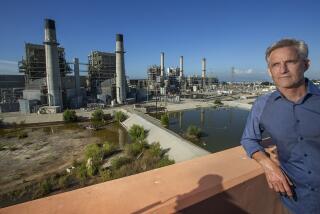Riordan’s Next Role
Richard Riordan seems far more tempted these days to run for governor than to pedal off into the sunset. Whether the mayor is serious or just reluctant to give up center stage is anyone’s guess. But his public musings about the possibility put a brighter spotlight on his eight years in the office he leaves Saturday.
Is Los Angeles better off now than it was eight years ago? Unquestionably. Elected in the midst of riots and recession, Riordan came into office in 1993 promising to improve public safety and the economy. The economy soared, but Riordan can’t take much credit. As mayor, he did push to cut red tape and business taxes. Mostly he rode a wave of national and state recovery.
During Riordan’s first six years, crime rates dropped, again part of a national trend. But in his last two years, Riordan stumbled badly in his efforts to rebuild the Los Angeles Police Department. He was slow to respond to the Rampart scandal and wrong in resisting the imposition of a federal consent decree. Crime rates are rising again, attrition is eroding LAPD staffing levels and morale is lower still.
If he failed there, Riordan accomplished the rewriting of the city charter. And his unorthodox support of public schools reshaped a once-entrenched school board. There he used his bully pulpit and his own money in an arena where the mayor has no official power.
Riordan made few promises and kept most of them. By that measure--the Ronald Reagan model--he has been a success. But given the times, given the boost the city got from the national boom, he had the chance to do so much more. That he didn’t is partly due to his clumsiness at the art of politicking.
His relationship with the City Council has been notoriously testy, but that was not the only place he neglected coalitions. A strong supporter of expanding Los Angeles International Airport, he nevertheless failed to lead regionally, to emphasize the importance of LAX to the Southland’s economy and to look for a way to spread both its problems and benefits. Instead, he stood by as 100 nearby cities coalesced against expansion.
Elected with the support of the San Fernando Valley, Riordan was unable to stop the Valley secession drive. He ran against government so effectively that he convinced voters that government is the problem. A recent Times poll found that Angelenos felt better about their city but worse about its leaders, including him.
Riordan campaigned to change government, but aside from the lasting legacy of charter reform, most of what the businessman-turned-politician accomplished in office came from working outside the government structure. That role as champion of schools, libraries and parks can remain his outside the mayor’s office. The question he must ask himself as he ponders a run for governor is whether he can serve better as a politician or an entrepreneur.
More to Read
Get the L.A. Times Politics newsletter
Deeply reported insights into legislation, politics and policy from Sacramento, Washington and beyond. In your inbox three times per week.
You may occasionally receive promotional content from the Los Angeles Times.










